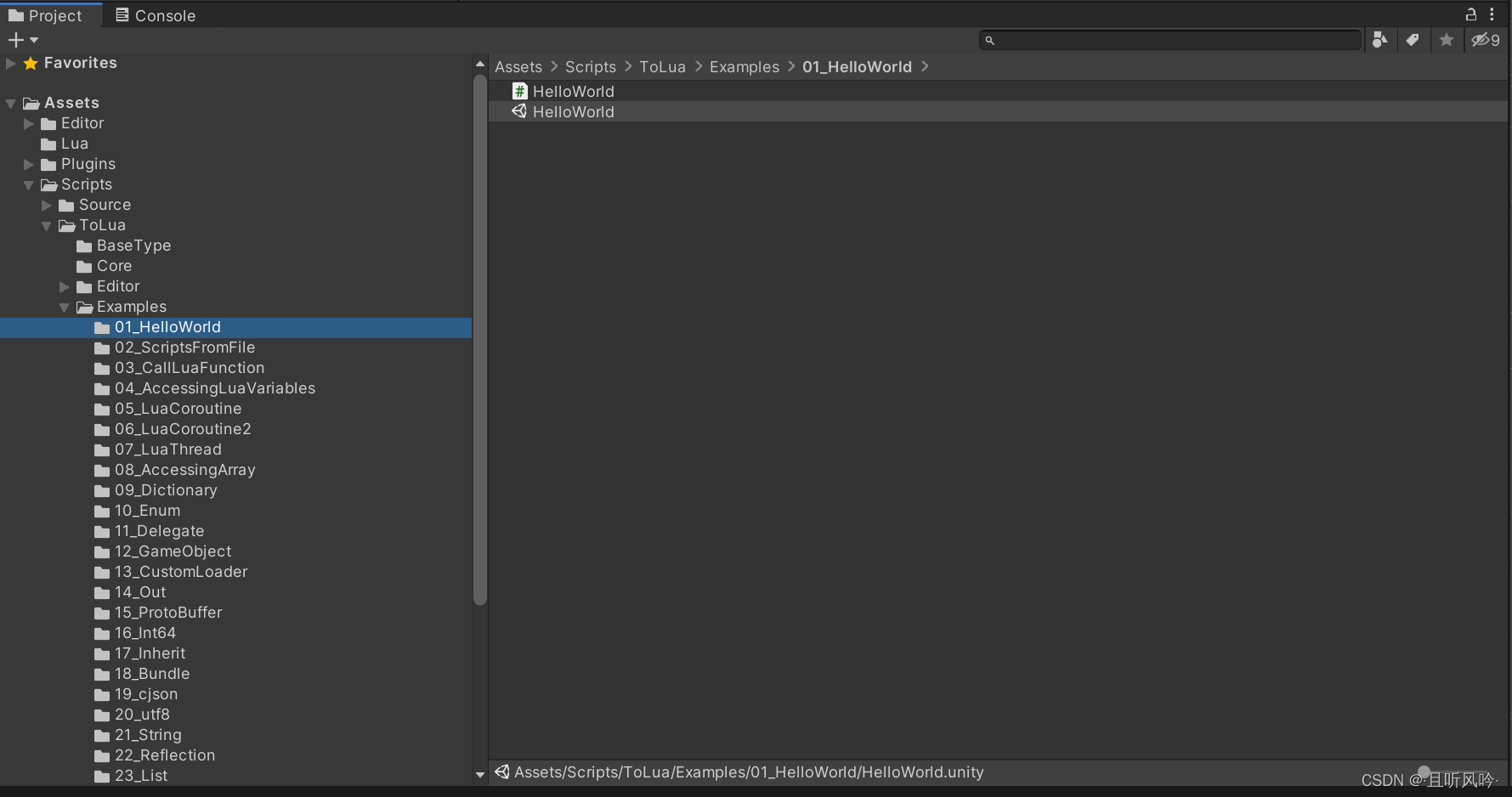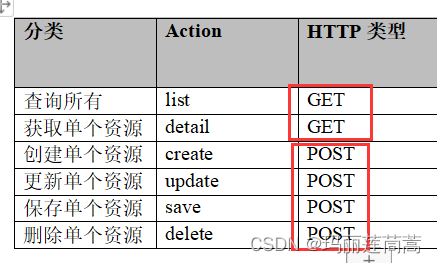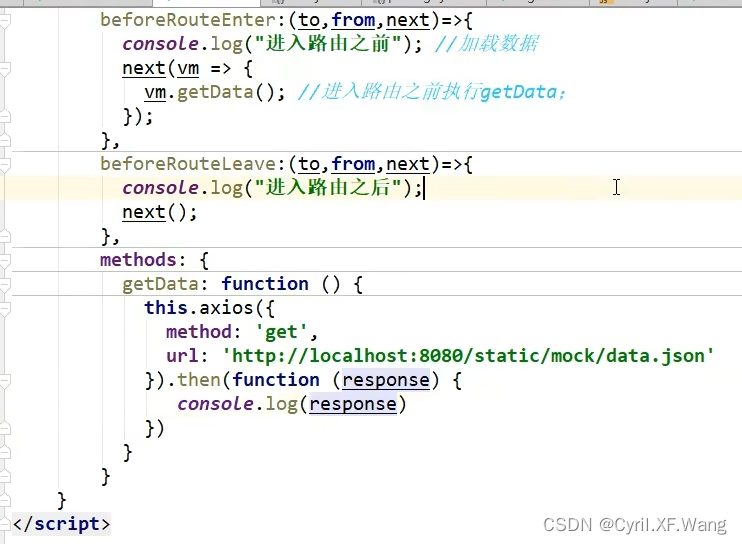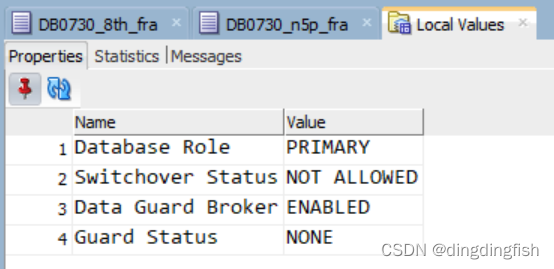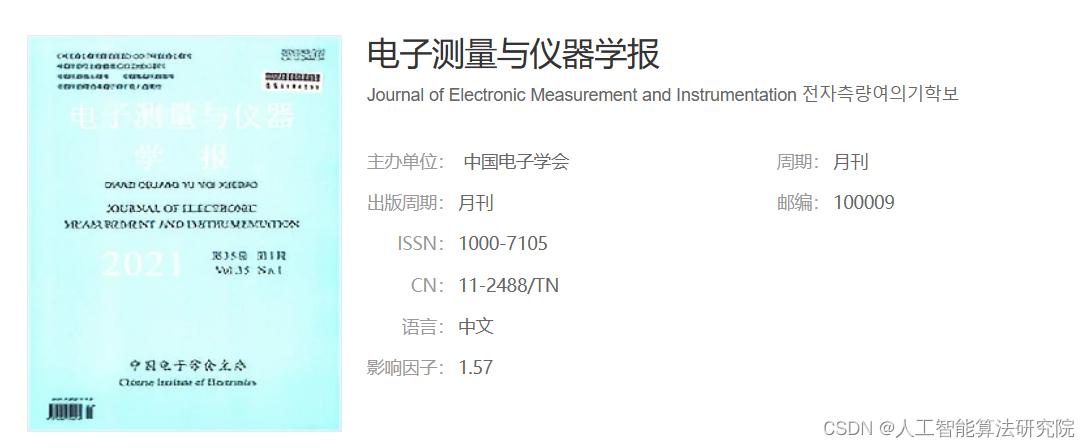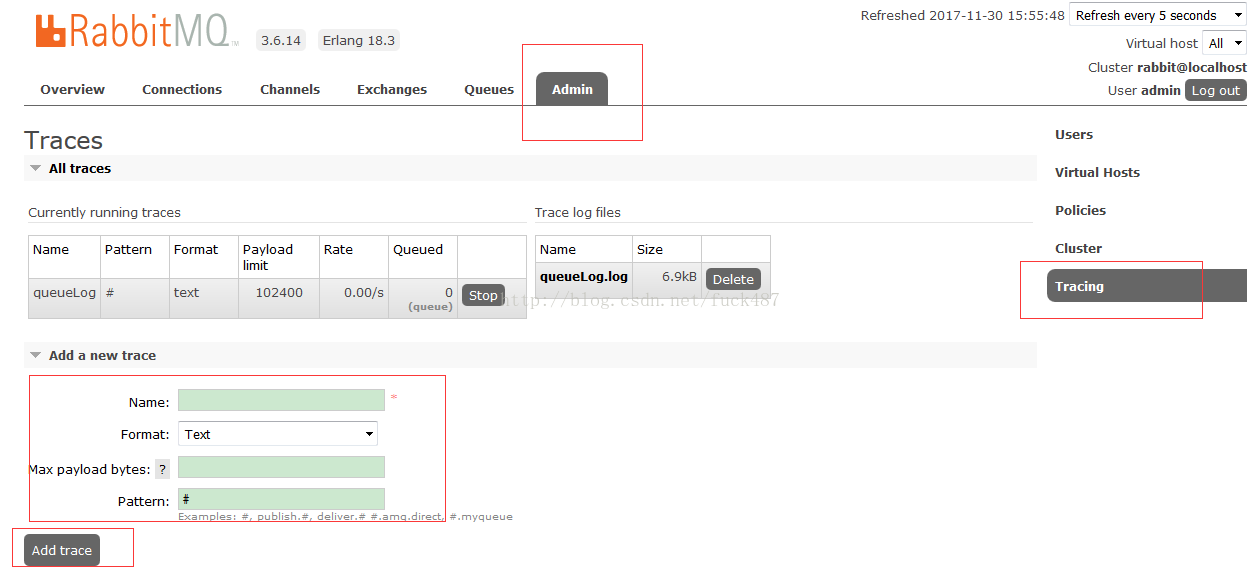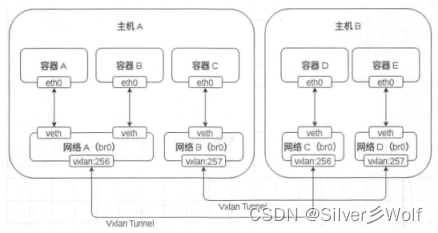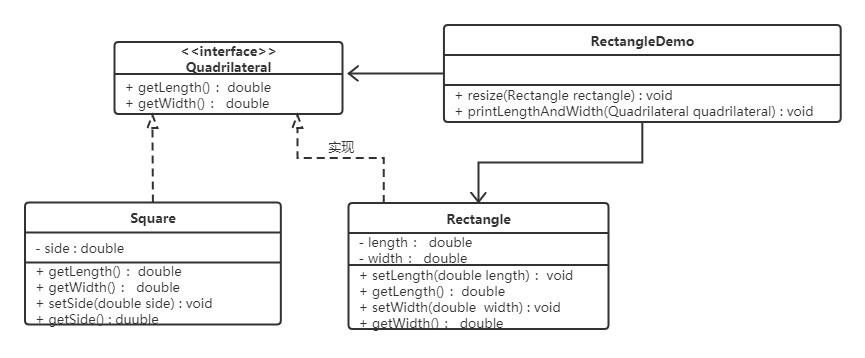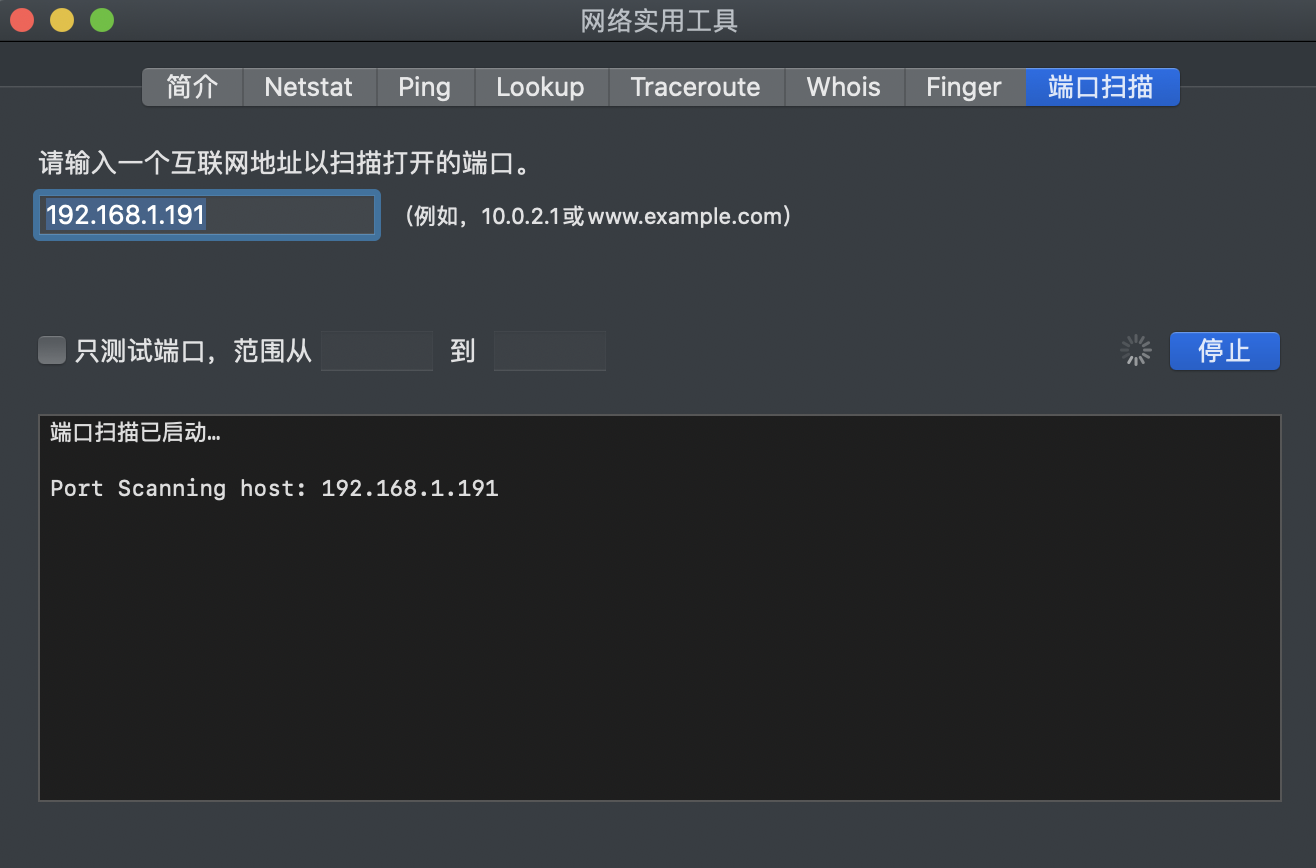介绍
- FFmpeg的 libavcodec 模块完成音视频多媒体的编解码模块。
- 老版本的 FFmpeg 将avcodec_decode_video2()作为视频的解码函数 API,将avcodec_decode_audio4()作为音频的解码函数 API;从 3.4版本开始已经将二者标记为废弃过时 API(attribute_deprecated)。
- 新版本 FFmpeg 将 avcodec_send_packet() 与 avcodec_receive_frame() 作为音视频的解码函数 API,但同时仍然保留了对老接口的兼容,通过avcodec_decode_video2()、avcodec_decode_audio4()调用 compat_decode()完成对新 API 的封装。
//具体可以参考 FFmpeg 中 doc/APIchanges 中的记录.2016-04-21 - 7fc329e - lavc 57.37.100 - avcodec.hAdd a new audio/video encoding and decoding API with decoupled inputand output -- avcodec_send_packet(), avcodec_receive_frame(),avcodec_send_frame() and avcodec_receive_packet().2017-09-26 - b1cf151c4d - lavc 57.106.102 - avcodec.hDeprecate AVCodecContext.refcounted_frames. This was useful for deprecatedAPI only (avcodec_decode_video2/avcodec_decode_audio4). The new decode APIs(avcodec_send_packet/avcodec_receive_frame) always work with referencecounted frames.
视频解码详细流程
- 以解码 H264标准为例,从 main 函数到最后的 MB 宏块解码。

解码的核心 API 介绍
avcodec_send_packet()
- API 申明介绍
* @param avctx codec context* @param[in] avpkt The input AVPacket. Usually, this will be a single video* frame, or several complete audio frames.* Ownership of the packet remains with the caller, and the* decoder will not write to the packet. The decoder may create* a reference to the packet data (or copy it if the packet is* not reference-counted).* Unlike with older APIs, the packet is always fully consumed,* and if it contains multiple frames (e.g. some audio codecs),* will require you to call avcodec_receive_frame() multiple* times afterwards before you can send a new packet.* It can be NULL (or an AVPacket with data set to NULL and* size set to 0); in this case, it is considered a flush* packet, which signals the end of the stream. Sending the* first flush packet will return success. Subsequent ones are* unnecessary and will return AVERROR_EOF. If the decoder* still has frames buffered, it will return them after sending* a flush packet.** @return 0 on success, otherwise negative error code:* AVERROR(EAGAIN): input is not accepted in the current state - user* must read output with avcodec_receive_frame() (once* all output is read, the packet should be resent, and* the call will not fail with EAGAIN).* AVERROR_EOF: the decoder has been flushed, and no new packets can* be sent to it (also returned if more than 1 flush* packet is sent)* AVERROR(EINVAL): codec not opened, it is an encoder, or requires flush* AVERROR(ENOMEM): failed to add packet to internal queue, or similar* other errors: legitimate decoding errors*/
int avcodec_send_packet(AVCodecContext *avctx, const AVPacket *avpkt);
-
avcodec_send_packet()定义解析
该 API 可以理解为 FFmpeg 完成音视频解码的核心函数,从函数的实现中可以看到,首先会调用av_bsf_send_packet()函数将输入的 AVPacket 拷贝到 buffer 中。最后当 buffer_frame为空的时候,就调用decode_receive_frame_internal()函数完成真正的解码。decode_receive_frame_internal()内部会调用decode_simple_receive_frame()完成解码。
decode_simple_receive_frame()内部会调用decode_simple_internal()完成解码。
而在decode_simple_internal()通过函数指针(*decode())指向不同的解码器完成解码不同标准的解码过程;如果涉及到多线程解码,还会涉及到ff_thread_decode_frame(),多线程解码不详细介绍。
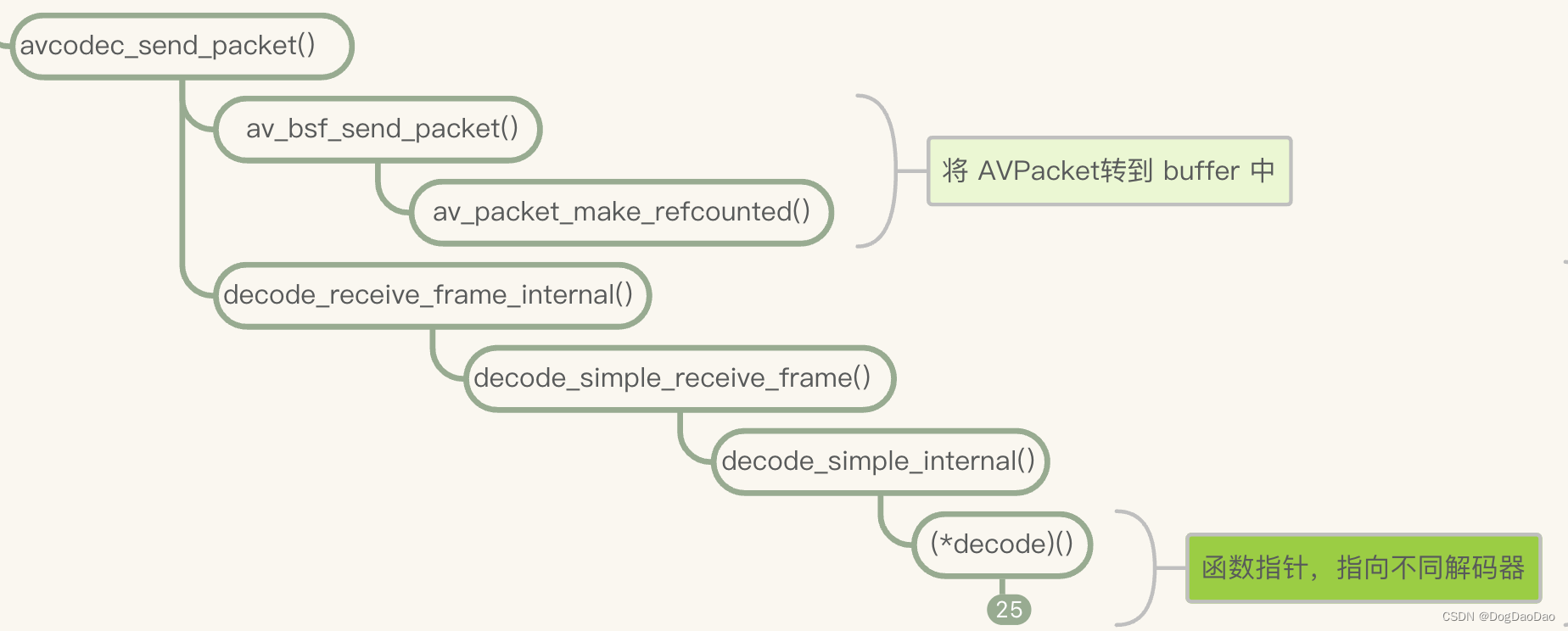
-
(*decode())函数指针
在 decode_simple_internal()通过ret = avctx->codec->decode(avctx, frame, &got_frame, pkt)实现对不同解码器的调用,完成具体的解码过程。以h264解码为例,h264_decode_frame()完成了具体的解码过程,其中核心函数是 decode_nal_units()进行 NAUL 解码;其中ff_H2645_packet_split()进行码流解析, ff_h264_execute_decode_slices()进行 Slice 级解码。
在ff_h264_execute_decode_slices()核心函数是 decode_slice(),对每个 Slice 进行解码。
decode_slice()中是视频数据的核心解码过程,主要分成四个模块:熵解码、宏块解码、环路滤波、错误隐藏。其中 ff_h264_decode_mb_cabac()完成熵解码(如果熵解码是 cavlc,则会ff_h264_decode_mb_cavlac 完成熵解码);ff_h264_decode_mb()完成宏块 MB 解码;loop_filter()完成环路滤波;er_add_slice()完成错误隐藏处理。
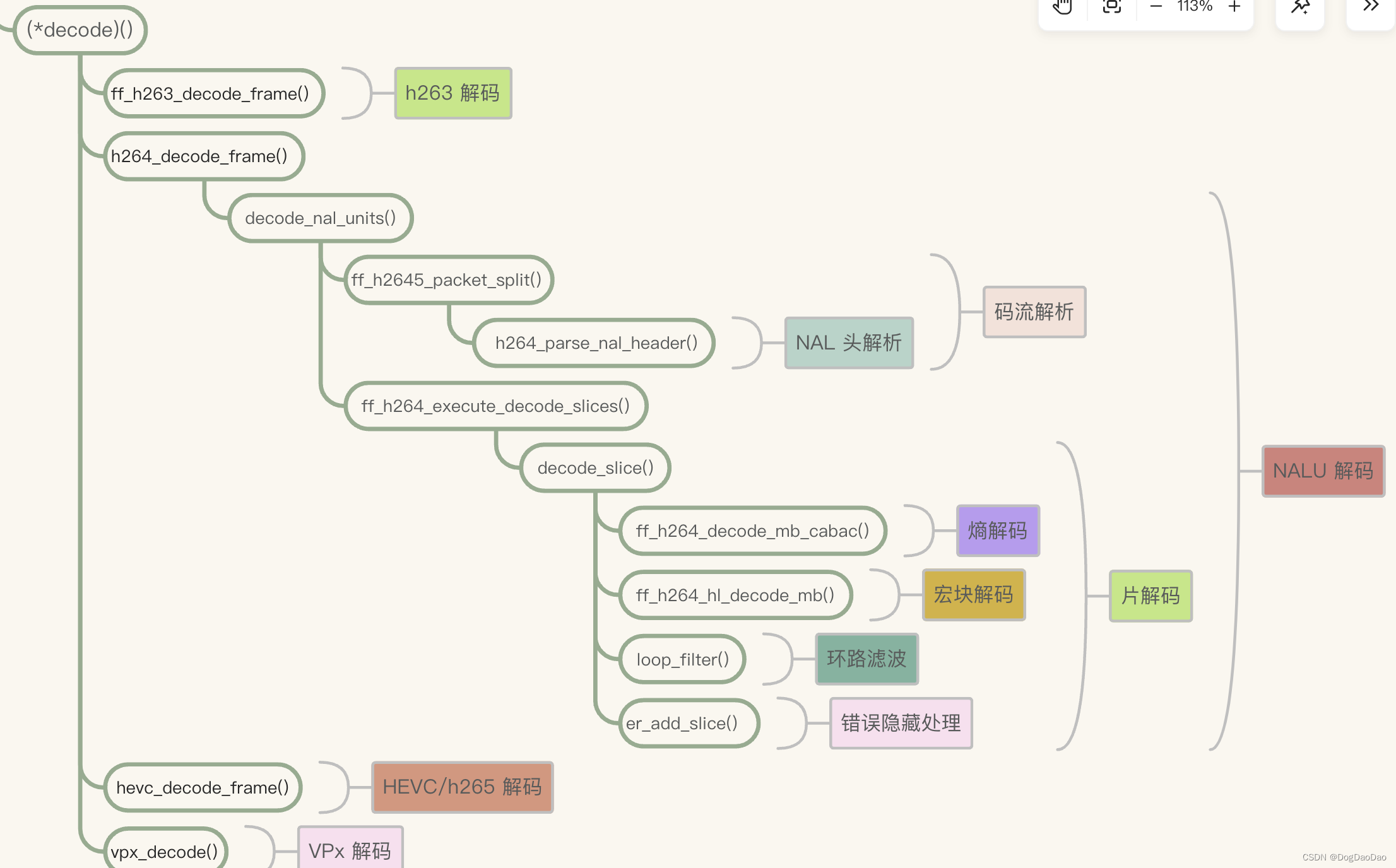
avcodec_receive_frame()
- API 申明介绍
/*** Return decoded output data from a decoder.//从解码器返回解码后的输出数据** @param avctx codec context* @param frame This will be set to a reference-counted video or audio* frame (depending on the decoder type) allocated by the* decoder. Note that the function will always call* av_frame_unref(frame) before doing anything else.** @return* 0: success, a frame was returned* AVERROR(EAGAIN): output is not available in this state - user must try* to send new input* AVERROR_EOF: the decoder has been fully flushed, and there will be* no more output frames* AVERROR(EINVAL): codec not opened, or it is an encoder* AVERROR_INPUT_CHANGED: current decoded frame has changed parameters* with respect to first decoded frame. Applicable* when flag AV_CODEC_FLAG_DROPCHANGED is set.* other negative values: legitimate decoding errors*/
int avcodec_receive_frame(AVCodecContext *avctx, AVFrame *frame);
- avcodec_receive_frame()定义解析
从avcodec_receive_frame()函数内部实现可以看到,核心逻辑相对简单,先判断buffer_frame里是否有数据,如果有直接调用av_frame_move_ref()完成frame 拷贝过程,解码后数据从buffer_frame拷贝到 frame 中(即把数据从 AVCodecContext 中拷贝到 AVFrame 中);如果 buffer_frame中没有数据,则需要调用decode_receive_frame_internal()完成具体的解码,该步骤和 send packet 模块相同。

官方解码实例
/** Copyright (c) 2001 Fabrice Bellard** Permission is hereby granted, free of charge, to any person obtaining a copy* of this software and associated documentation files (the "Software"), to deal* in the Software without restriction, including without limitation the rights* to use, copy, modify, merge, publish, distribute, sublicense, and/or sell* copies of the Software, and to permit persons to whom the Software is* furnished to do so, subject to the following conditions:** The above copyright notice and this permission notice shall be included in* all copies or substantial portions of the Software.** THE SOFTWARE IS PROVIDED "AS IS", WITHOUT WARRANTY OF ANY KIND, EXPRESS OR* IMPLIED, INCLUDING BUT NOT LIMITED TO THE WARRANTIES OF MERCHANTABILITY,* FITNESS FOR A PARTICULAR PURPOSE AND NONINFRINGEMENT. IN NO EVENT SHALL* THE AUTHORS OR COPYRIGHT HOLDERS BE LIABLE FOR ANY CLAIM, DAMAGES OR OTHER* LIABILITY, WHETHER IN AN ACTION OF CONTRACT, TORT OR OTHERWISE, ARISING FROM,* OUT OF OR IN CONNECTION WITH THE SOFTWARE OR THE USE OR OTHER DEALINGS IN* THE SOFTWARE.*//*** @file* video decoding with libavcodec API example** @example decode_video.c*/#include <stdio.h>
#include <stdlib.h>
#include <string.h>#include <libavcodec/avcodec.h>#define INBUF_SIZE 4096static void pgm_save(unsigned char *buf, int wrap, int xsize, int ysize,char *filename)
{FILE *f;int i;f = fopen(filename,"w");fprintf(f, "P5\n%d %d\n%d\n", xsize, ysize, 255);for (i = 0; i < ysize; i++)fwrite(buf + i * wrap, 1, xsize, f);fclose(f);
}static void decode(AVCodecContext *dec_ctx, AVFrame *frame, AVPacket *pkt,const char *filename)
{char buf[1024];int ret;ret = avcodec_send_packet(dec_ctx, pkt);if (ret < 0) {fprintf(stderr, "Error sending a packet for decoding\n");exit(1);}while (ret >= 0) {ret = avcodec_receive_frame(dec_ctx, frame);if (ret == AVERROR(EAGAIN) || ret == AVERROR_EOF)return;else if (ret < 0) {fprintf(stderr, "Error during decoding\n");exit(1);}printf("saving frame %3d\n", dec_ctx->frame_number);fflush(stdout);/* the picture is allocated by the decoder. no need tofree it */snprintf(buf, sizeof(buf), "%s-%d", filename, dec_ctx->frame_number);pgm_save(frame->data[0], frame->linesize[0],frame->width, frame->height, buf);}
}int main(int argc, char **argv)
{const char *filename, *outfilename;const AVCodec *codec;AVCodecParserContext *parser;AVCodecContext *c= NULL;FILE *f;AVFrame *frame;uint8_t inbuf[INBUF_SIZE + AV_INPUT_BUFFER_PADDING_SIZE];uint8_t *data;size_t data_size;int ret;AVPacket *pkt;if (argc <= 2) {fprintf(stderr, "Usage: %s <input file> <output file>\n""And check your input file is encoded by mpeg1video please.\n", argv[0]);exit(0);}filename = argv[1];outfilename = argv[2];pkt = av_packet_alloc();if (!pkt)exit(1);/* set end of buffer to 0 (this ensures that no overreading happens for damaged MPEG streams) */memset(inbuf + INBUF_SIZE, 0, AV_INPUT_BUFFER_PADDING_SIZE);/* find the MPEG-1 video decoder */codec = avcodec_find_decoder(AV_CODEC_ID_MPEG1VIDEO);if (!codec) {fprintf(stderr, "Codec not found\n");exit(1);}parser = av_parser_init(codec->id);if (!parser) {fprintf(stderr, "parser not found\n");exit(1);}c = avcodec_alloc_context3(codec);if (!c) {fprintf(stderr, "Could not allocate video codec context\n");exit(1);}/* For some codecs, such as msmpeg4 and mpeg4, width and heightMUST be initialized there because this information is notavailable in the bitstream. *//* open it */if (avcodec_open2(c, codec, NULL) < 0) {fprintf(stderr, "Could not open codec\n");exit(1);}f = fopen(filename, "rb");if (!f) {fprintf(stderr, "Could not open %s\n", filename);exit(1);}frame = av_frame_alloc();if (!frame) {fprintf(stderr, "Could not allocate video frame\n");exit(1);}while (!feof(f)) {/* read raw data from the input file */data_size = fread(inbuf, 1, INBUF_SIZE, f);if (!data_size)break;/* use the parser to split the data into frames */data = inbuf;while (data_size > 0) {ret = av_parser_parse2(parser, c, &pkt->data, &pkt->size,data, data_size, AV_NOPTS_VALUE, AV_NOPTS_VALUE, 0);if (ret < 0) {fprintf(stderr, "Error while parsing\n");exit(1);}data += ret;data_size -= ret;if (pkt->size)decode(c, frame, pkt, outfilename);}}/* flush the decoder */decode(c, frame, NULL, outfilename);fclose(f);av_parser_close(parser);avcodec_free_context(&c);av_frame_free(&frame);av_packet_free(&pkt);return 0;
}参考
- http://ffmpeg.org/

![SSM(Vue3+ElementPlus+Axios+SSM前后端分离)--搭建Vue 前端工程[一]](https://img-blog.csdnimg.cn/img_convert/43e0cc595418c536362a57e2dd1fc6bd.png)


